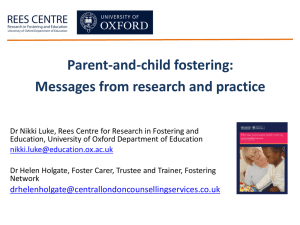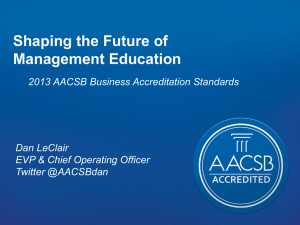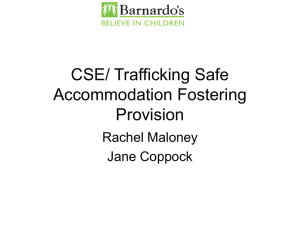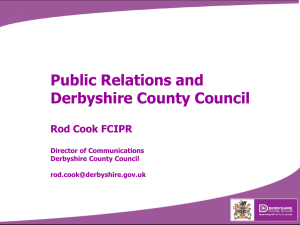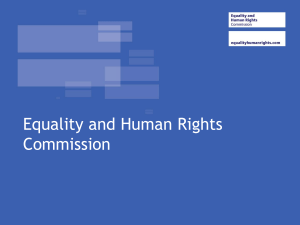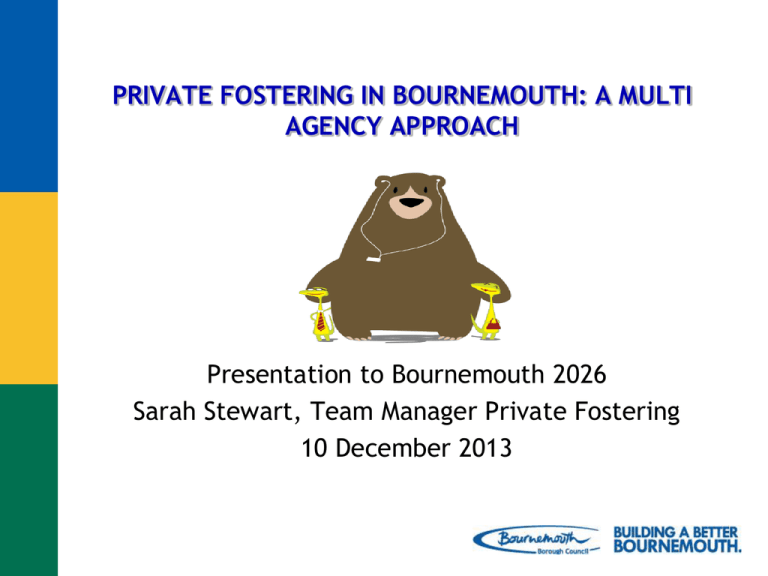
PRIVATE FOSTERING IN BOURNEMOUTH: A MULTI
AGENCY APPROACH
Presentation to Bournemouth 2026
Sarah Stewart, Team Manager Private Fostering
10 December 2013
OVERVIEW
•
What is Private Fostering?
•
Understand why children and young people might be Privately
Fostered
•
What are the roles and responsibilities of parents, carers, the
local authority and other agencies in private fostering
arrangements
•
The role of the child's social worker in the assessment and
monitoring of Private Fostering arrangements
•
Understand how to make a referral or how to seek further
advice and support regarding possible private fostering
arrangements
A private
arrangement
between parent
and carer.
To live away
from home and
be cared for by
someone who
is not a parent,
a person with
PR or a ‘close
relative’
For a child
who is under
16 (under 18
if disabled)
What is
Private Fostering?
(legally defined as;
Step parent,
Grandparent,
Sister, Brother, Aunt
or Uncle)
For 28 days
or more
WHY CHILDREN MAY BECOME
PRIVATELY FOSTERED
•
•
•
•
•
•
•
•
Parental illness
Substance misuse
Mental health issues
Parent in prison
Family crisis
Row with parents
Decision of child with, or without, parent’s consent
Parents gone overseas or working elsewhere in UK
OTHER CIRCUMSTANCES
•
•
•
•
•
•
•
To complete education
Attending a language school
During boarding school holidays
Sent to UK for a ‘better life’ / asylum seekers
Parent from overseas studying in UK
From overseas with a view to adoption
Trafficked into the UK
Safeguarding – whose
responsibility?
• Private foster carers are responsible for providing day to day
care that promotes and safeguards the child’s welfare
• Parents retain PR and overarching responsibility for
safeguarding and promoting their child’s welfare
• Other agencies and professionals have a safeguarding duty to
notify the local authority of private fostering arrangements
that they are aware of
• Local authorities have statutory duties in relation to Private
Fostering arrangements
• Private Fostering Services are inspected by Ofsted
Local Authorities have a duty to:
Satisfy themselves that the welfare of the privately
fostered child is being satisfactorily safeguarded and
promoted and to determine the suitability of all aspects of
the Private Fostering arrangements in accordance with the
regulations
Advise and support children who are privately fostered,
their parents and carers
Promote awareness in their area, amongst both
professionals and the wider community of the legal
requirement to notify them of private fostering
arrangement
We must also:
Raise the number of notifications in general
and in particular the notifications of
arrangements before they start.
Produce an annual report to the LSCB
Report directly to the Department of
Education on an annual basis regarding the
number of notifications and how well they
have met their duties.
The Regulations 2005 require that:
• The person who proposes care for a child notifies the Local
Authority in writing six weeks in advance or immediately if the
arrangement is due to begin within the next six weeks. It is an
offence for a Private Foster carer not to report a private
fostering arrangement.
• An agency who becomes aware of such an arrangement
ensures that the Local Authority is notified.
• When the child moves into a Private Fostering arrangement the
Local Authority must be informed within 48 hours. If this has
not happened for any reason the Local Authority must be
informed immediately
Actions of Private Fostering team
Once notified of either a proposed or actual Private Fostering
arrangement a social worker of the Local Authority must visit
the placement within 7 working days.
The social worker must speak to all members of the household
and must speak to the child alone. Visits must also be made
to those with parental responsibility (where it is practical).
Children Social Care checks and statutory checks including
personal and employment reference and medical checks will
be undertaken and a DBS check (if not completed by a
language school) will be completed on all household member
over 16+
Within 42 working days of the notification of the
proposed or actual arrangement the Local Authority
must make a decision on the suitability of the
placement and complete an assessment accordingly.
If considered that the arrangement is suitable the
child must be visited by a social worker and spoken
to alone at intervals no longer than 6 weeks for the
first year and intervals not longer than 12 weeks
thereafter. The Private Foster Carer must allow all
visits and a written report must be completed after
each visit.
The local authority must be informed within 48
hours of any change of circumstance, including
ending the arrangement, any changes to the
household or a member of the household being
charged or cautioned by police.
Local Authorities have the power to impose
requirements on Private Foster Carer such as the
age, number and sex of children that they privately
foster.
The Local Authority can impose a prohibition on a
person that they consider is not suitable to privately
foster.
Assessment and monitoring
of arrangements
In Bournemouth we have set up a dedicated team of
social workers to receive all notifications and assess
suitability of arrangements.
The team currently consists of:
•
•
•
1 Team Manager
1 Practice Manager
6 Social Workers
Referral process
Children First
01202 458101
Direct from language
schools
childrenfirst@bournemouth.gov.uk
Notification form sent directly to
Will take initial
information and pass
the notification on to
Private Fostering team
Privatefostering@bournemouth.gov.uk
If in any doubt please
contact the Private
Fostering team for advice,
guidance and support:
01202 454971
How you can help?
Frontline professionals and their employing
organisations coming into contact with children are
in a unique position to identify potential private
fostering arrangements and encourage carers and
parents to contact Children Social Care
Teachers and learning support staff including
independent sector, GPs, Health Visitors,
Paediatric Nurses and Doctors, Police Officer,
childcare professionals working in the voluntary
sector, Sure Start and Early Year workers, Housing
and the Voluntary Sector play an important role in
identification.
Professional duty to report
Your role is initially one of
encouraging the parent or carer to
report the notification
Should the parent or carer fail to do
so, you should contact Children Social
Care via the Private Fostering team
Promoting the message
We want you to display the leaflets and posters in your
own professional setting.
Contact: privatefostering@bournemouth.gov.uk to place
an order for publicity material
We want you to think about how you receive
information about Private Fostering in your professional
and work based training and how you can disseminate
your knowledge to other colleagues
Children will be best protected where there is a culture
of Multi-agency ownership of the Private Fostering
agenda and awareness is built into professional training
and development programmes – just as we are doing
today.
And finally, when you think of Private
Fostering think of Victoria Climbie.
THANK YOU FOR TAKING TIME TO LISTEN
HAVE YOU ANY QUESTIONS?

